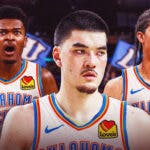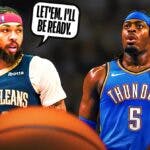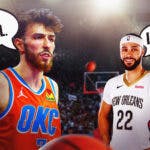The mere concept of trading Russell Westbrook might be too fraught for the Oklahoma City Thunder to fathom.
No player in the league, with the ever notable exception of Damian Lillard, is more synonymous with his team than the Thunder's superstar point guard. He was a reckless rookie for the Thunder's 3-29 start during their debut season in Oklahoma City; a singular driving force of will and athleticism behind their half decade as perennial title contenders; and their lone remaining sense of hope in the aftermath of Kevin Durant's acrimonious departure to the Golden State Warriors.
Westbrook simply means more to Thunder, maybe much more, than most franchise players do to their teams – off the court, at least. But his cultural import doesn't change the fact that Oklahoma City is bowing out of the playoffs in the first round for the third consecutive season, pushing Westbrook's playoff record without Durant to a dismal 4-12.
The four-year extension Paul George signed last summer makes it a double-edged sword for Sam Presti with regard to Westbrook's future. Trading him would be easier for the Thunder to stomach with the knowledge that doing so wouldn't inevitably begin an arduous rebuilding process, but going that drastic route would almost surely mean Oklahoma City takes a step back in the Western Conference pecking order right in the thick of George's prime.
Teams almost never swap players of Westbrook's reputation and caliber one-for-one, and George, even after the best season of his career, probably doesn't have the tools to be the undisputed alpha dog on a championship-worthy offense. Maybe Westbrook could be dealt for a package of young players under team control that allow for the possibility of the Thunder reorienting themselves as a whole greater than the sum of its parts, exactly the opposite of the team-wide dynamic throughout their time in Oklahoma City.
But even if Presti and company worked up the courage to make Westbrook available, an even more limiting factor would loom. Just what could a non-shooting, ball-dominant guard with declining athleticism, an aversion to the basic principals of defense, and hard-headed playing persona fetch on the trade block – even if he wasn't due a whopping $171 million over the next four seasons?
John Wall's contract is the worst in basketball. At 28, with a long history of injuries and comping off multiple surgeries, including one to repair a torn Achilles tendon, he'll be paid $168 million by the Washington Wizards before he's a free agent again in the summer of 2023. It seems highly unlikely Wall will ever reach the baseline level of play that got him the super max in July 2017, let alone surpass it to make him worthy of a contract that's bound to hold the Wizards back until it expires.
Westbrook is better than Wall, and his comparatively clean bill of health suggests his future is brighter despite him being on the wrong side of 30. His contract isn't more onerous for the Thunder than Wall's is for Washington. But after that, is there a single deal in the league more debilitating to a team's long-term future than Westbrook's? That it's even a question worth asking says all anyone needs to know about Oklahoma City being stuck between a rock and a hard place with basketball's resident lightning rod.
In 2018-19, Westbrook joined a retiring Kobe Bryant as just the second player since 2008 to post a usage rate above 30 and true shooting percentage below 51.0, per basketball-reference. He notched the lowest free-throw rate of his career and set a new personal threshold for volume and inefficiency from beyond the arc. Most damning, the Thunder sunk this season when Westbrook was on the floor without George, scoring less than a point per possession, but kept their head well above water when George was playing without Westbrook – a dynamic that became even more pronounced in their five-game loss to the Portland Trail Blazers.
Even at his peak, during that ridiculous 2016-17 season, Westbrook couldn't push Oklahoma City to any better than league average offensively. His solid shooting numbers back then have been proven a bigger outlier than this year's dreadful marks from the perimeter, too. Any expectation that Westbrook, like Jason Kidd, might evolve into a reliable three-point shooter – off the dribble or the catch – late in his career is based on nothing more than hopeful optimism.
Still, the chances of that development coming to fruition are probably higher than those Westbrook will ever be comfortable ceding control of his team's offense, cutting back on pull-up twos, one-footed fadeaways from the post, and three-point attempts the opponent is happy to concede to foster a more egalitarian style of attack.
To be fair, Presti hasn't exactly filled out the Thunder's roster with the type of players who could benefit the team from shouldering more responsibility offensively. Oklahoma City has needed shooting dating back to the early days of Durant, and been searching for an entrenched tertiary scoring option ever since trading James Harden. It's not like Scott Brooks or Billy Donovan run the most innovative halfcourt offenses, either.
But at least some of the Thunder's inability to surround its stars with the personnel and strategic infrastructure needed to maximize their offensive gifts lays at the feet of Westbrook. He's been the same player, in style and substance, for years now, with single-season effectiveness on jumpers proving the only variance in his game. Even when he pulls back on the reins, like he did a bit throughout the regular season and at the beginning of Game 5, Westbrook can't help but revert back to his stubborn shoot-first ways when it matters most.
Multiple disappointing postseason outcomes will almost always spell meaningful change. Oklahoma City thought it owned up to that reality last July, shipping Carmelo Anthony out of town to promote a two-way identity that at times crystallized during the regular season. But the playoffs have a way magnifying weaknesses, and Westbrook, for all his objective strengths, was unable to mitigate his against Damian Lillard and the Blazers.
Trading him, from purely a basketball perspective, would undoubtedly be the Thunder's most prudent way forward. But Westbrook's value to the organization far outweighs his receding value on the floor, a situation that makes his albatross of a contract more palatable for Oklahoma City than any other team in the league.
Where should the Thunder go from here? There's no easy answer. Either way, Westbrook needs to be at the center of his team's decision.




